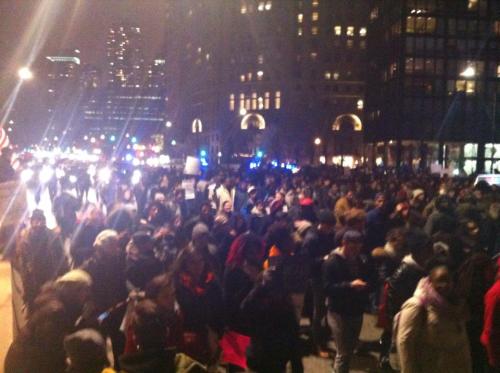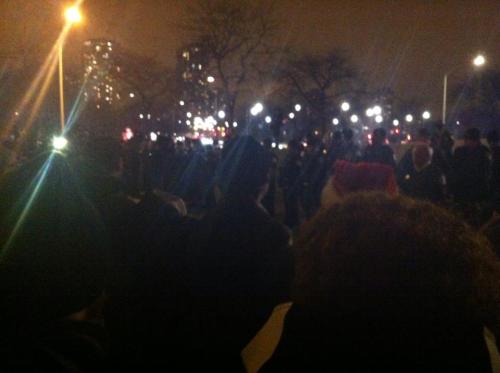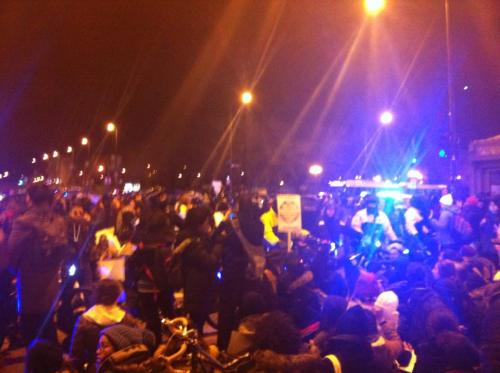Let me begin by making the following statement:
The Addison Recorder is not a political blog. We talk about popular culture here, and how it affects us at large. We shy away from politics – it’s not our specialty by any means. With that being said, the recent events in Ferguson, MO, New York, Cleveland, etc. (too many to list, sadly) have transcended pure politics and instead have become a cultural movement, a moment of recognition of how people relate to one another in America. This is a national moment, a historical moment, and that’s what drove me to the streets of downtown Chicago on Thursday night (12/4/14) to protest the failure to indict the police officers responsible for the choke-hold death of Eric Garner. I was joined in this by Alex, Andrew, and over a thousand other outraged citizens. Surreal, exhilarating, at times terrifying, it was something that needed to be done.
Alex and I sat down afterward to discuss the protest, the events of the past several months that have inflamed the country, and how racism is deeply ingrained in our popular culture. As editor-in-chief, I feel this is too important to ignore – especially considering that we have a widespread platform with which to hold a dialogue that needs to be held. Therefore, we see it as our obligation to begin that dialogue, and I encourage you to not immediately close out of your browser if such a piece causes discomfort. Only by acknowledging that this is a discussion that needs to be held can we begin to try and move forward as a country.
The Heat of the Moment
So, Alex, let me first start with the protest itself: how surreal was it to be walking down Lake Shore Drive holding a banner with traffic utterly shut down? What’s your overall impression of the evening?
Alex:
It was quite unlike anything else I have ever done. Anyone who is friends with me on Facebook knows that I am not shy about posting political articles and images, but the events of the past few months need more than that. The injustices of our system were always awful, but the senseless murders of Mike Brown, Eric Garner, and Tamir Rice shook me to the core. So to the streets we went, and I had no idea what to expect.
I was a jumble of nerves and adrenaline as I walked down to the start of the protest because I had never been to a political protest before. The start of the protest, with a bunch of nervous and confused folks standing around and shouting hesitantly wasn’t thrilling. But when we began to march it was unreal in the most beautiful way. I must have bellowed “Hands Up!” over a thousand times in the first 90 minutes we marched before losing my shouting voice. We walked for miles and miles without a plan to do anything but interrupt downtown Chicago’s traffic just as violence had interrupted the lives of people of color for centuries in America.
When we joined Charles, a 60-year-old black veteran carrying the banner (picture above) it felt both right and otherworldly. Then it became our charge alone as we marched down the Mag Mile and then Lake Shore Drive and I may never feel more politically relevant than I did in those 90 minutes. I hugged some of my students who crossed my path, ran into my friend Davis, and waved at a former co-worker who marched with a toddler up on his shoulders. But best of all was when drivers, whose paths we were impeding, honked their support to us. Postal trucks, CTA busses, cabs, and random cars all joyously showed their support for justice. I was nearly moved to tears dozens of times. Not sure that another march can match that experience, but I would do that all over again in an instant.
Travis:
Yeah, it was when we were leading the march on Lake Shore Drive – leading a thousand people on Lake Shore Drive in march and in chanting – that everything ceased to be real for me. I’m glad you mentioned adrenaline – that was coursing all night long. It was a peaceful moment, to be sure, but one filled with weight and meaning. At one point, Charles turned to me and said “Chicago’s been sleeping for a long time. We here to wake it up.”
But still, there were ugly moments. When we walked past the high rises in the Gold Coast, several angry people (who I must say were all white) yelled at us from their apartments. I couldn’t make out what they were saying exactly, but I did catch the phrase “Take your racist drivel out of here!” Now, I know the Gold Coast is an upper-class, predominately white neighborhood, but even so, I can’t really fathom how this was a racist march. There was no dominant race or ethnicity in the march, and the message was a cry for justice, unity, and understanding. One of the phrases we shouted, which was popular in South America during the middle of the 20th century, was “The people united will never be defeated/El pueblo unido jamás será vencido.” How can people call out reverse racism?
I know that there’s a strong call for understanding on both sides, which is fair. In order to have a dialogue, both sides must listen. That being said, this conversation is one of power as well, one dominated by a white class which for years has undermined blacks and other minorities. A point was made early on that the country was founded on an economy of slavery, which helped to pump wealth into the towering buildings surrounding us long after the end of the Antebellum South. But still, that was the first moment when I couldn’t understand how people could miss the point of the march so drastically.
The Not-Too-Distant Past
The other moment I want to talk about was confronting the police on Lake Shore Drive. Marching toward them in the dark generated an extreme feeling of fear in me. Normally, this would be an instance of #CrimingWhileWhite, where white people wouldn’t be bothered. However, our group as mentioned before was mixed. Safety might not be guaranteed. Now, I don’t think anyone was in any real danger at any point, but the image of a line of black-clad police officers blocking our path in near-pitch-black darkness was something out of a Batman movie. The ensuing standoff was breathtaking – I can only imagine what goes through protesters in more volatile communities such as Ferguson on a nightly basis.
Alex:
The people who yelled out those windows didn’t bother me much. We had already marched so far and seen so much support that finally coming across some reactionaries felt like nothing. Their jeers were awful but hardly unexpected in that neck of the woods. I mean, Bruce Rauner actually won that ward in last month’s gubernatorial election. Ugh. A protest march for justice and understanding is going to be threatening for people whose lives and livelihoods are built around a ream of privileges. I wish they knew better. But their intransigence could not stop our momentum tonight, and I loved that.
The line of police that barricaded our path on Lake Shore Drive was much more intimidating, I agree. They lined up across both sides of the highway on the top of overpass at North Avenue, which gave them both the high ground and some dramatic back-lighting. It was unnerving in a way that I have rarely felt in my life. I didn’t really think chaos would break out, but there were some definite instigators on our side and the police had been mirroring us all night long, so they had to be exhausted. The potential for this to look like 1968 was there.
But that was the whole reason to go out tonight! Those ten minutes of foreboding approach to the police was a minute taste of what #AliveWhileBlack showed so clearly. Protesting on the street rather than cyberspace was about putting my actual self out there. It was about facing that fear so I could understand how my friends, students, and fellow citizens feel every day. You stayed there a little longer than Andrew and I did. What was the actual meeting between police and protesters like?
Travis:
It was unnerving. Alarming. Frightening. Oscar Wilde (and Gene Wilder) said in The Importance of Being Earnest “The suspense is terrible…I hope it lasts.” That’s about how I feel regarding that moment. It was a rush, knowing that all it would take was one overzealous, angry protester or one tired, threatened cop, and a small riot could break out. Knowing that we live in the city where the Democratic riots of ’68 happened was rushing through my mind all night long. I agree completely with regards to the #AliveWhileBlack sentiment. Granted, it was only ten minutes, and in a relatively safe environment, but that danger…sheesh.
It ran so much in contrast to the overall feeling of much of our march. For most of it, the mood was exuberant, even jubilant. People were chanting, clapping one another on the back, embracing strangers. We became good friends with Charles almost by happenstance, once we wound up carrying that random-ass banner. People were even engaging in dialogue with the cops who shadowed us at every moment.
I want to take a moment to call out the police really quickly. We talked about this, and both agreed that they acquitted themselves very well. They never escalated any situation, didn’t respond to provocation, and protected the peace to the best of their ability. When people talked with them, they’d even laugh or crack jokes. I get that the CPD don’t want to cause a new crisis in Chicago, and acted accordingly. There’s a lot of tension in the air surrounding cops right now, understandably so. In a post I shared on Facebook, somebody made the point of not letting a few rotten apples spoil the whole bunch, and I agree with that, to a point. The underlying problem is not whether a cop is or is not racist, but the fact that for years, police have been trained to regard blacks, Latinos, and other minorities as dangerous, regardless of the situation. On a similar note, just the fact that we were continually flanked by cops wearing thick Kevlar vests and head wraps was remarkably unsettling.
Neither Victory nor Defeat
Now, I know we’re exhausted because we decided to write this directly after the march, but I have to ask: did this accomplish anything? Did going out, blocking traffic, chanting and waving signs help make a difference in the world? I feel that a statement was made, and that it’s our responsibility to continue to share our experiences, views, and beliefs in efforts to advance the conversation. I know my Facebook profile blew up throughout the night as I kept making updates about the march, and I’m hoping that not only sympathetic friends but contacts with opposing viewpoints to mine see them and start more conversations with me about what it means to be white and black in America. But what did we actually achieve out there, as we walked nine miles across the city of Chicago?
Alex:
Well, despite that URL on the banner we carried, I don’t think we launched a Communist Revolution tonight. Not that I want one of those, obviously. And a lot of what tonight’s leaders fulminated about (end of racism, reversal of slavery’s woes, mass political upheaval, something about Israel & Palestine, etc.) seems un-achievable in the near future. And our march did not have tactile political results a la the multiple protest revolutions in Egypt these past few years. So, I dunno.
What I hope is that the protest tonight will open eyes and raise attention for people who normally skip events like this. I admitted on Facebook that a year ago I would have stayed home and played video games on a night like this. When you sent me this event invite I really wrestled with whether or not to attend. It’s really easy to lob posts onto social media and call yourself politically active and therefore moral.
But marching those long miles with so many other people brimming with nervous excitement was something else. And the response from our friends to the images of our march tonight has been much stronger than yet another share session. The sense of personal investment certainly skyrocketed for me from being in the streets. Maybe seeing me in the streets will drive other people’s convictions and actions as well. Issues like racism and acquiescence to state-sponsored violence are not fixed completely with new laws or speeches, but with social change. As a society we have to stop taking injustice as a given. Calling out injustice in a public way is starting down the road to change. So let’s keep going.
Travis:
There’s two things I’d like to point out: the first is that I heard about this protest through a Facebook group invite. This wasn’t a planned event months in the making, bur rather a spontaneous gathering on social media, spread through shares. I briefly wrestled with going to this or not. As “busy” as we all are these days, and with Peter Pan on NBC, who really has time? In the end, though, it was an easy choice. I applied the “Will I regret not going to this in five years?” rule, with the answer being “Yup.” Because of its viral nature, I hope that future events can be spread with a similar broad, sweeping reach.
The second thing is that all we did was show up to a gathering. There’s nothing to stop others from starting similar events, or from starting petitions, or from attending town hall meetings and debates and taking local elected officials to task. We’re only effective as a culture if we remain involved in that culture. It’s stupidly easy to sit back, share some memes, and call it a day. It’s much harder to get off your ass and actually do something about it. I know I’ve opted for that choice multiple times in my life.
Hopefully, in some small way, we’ve started changing minds. Hopefully, we’ve started engaging people in debate. Hopefully, people will take more of an interest in how their cities, states, and federal governments are being run, and who is watching the watchmen, and how the watchmen are coming together. Hopefully, we can wake up tomorrow and find that we actually did something small to make the world a better place. Hopefully, change will finally happen. Hopefully, justice will be served. It might be absurdly unrealistic to hope that the world might one day become a better place, but if the alternative is sitting around and saying that nothing will ever change, I’ll take hope every time. Hopefully, we can dare once again to have hope.
Photo courtesy of DNAInfo.com. (And Travis’s iPhone)









